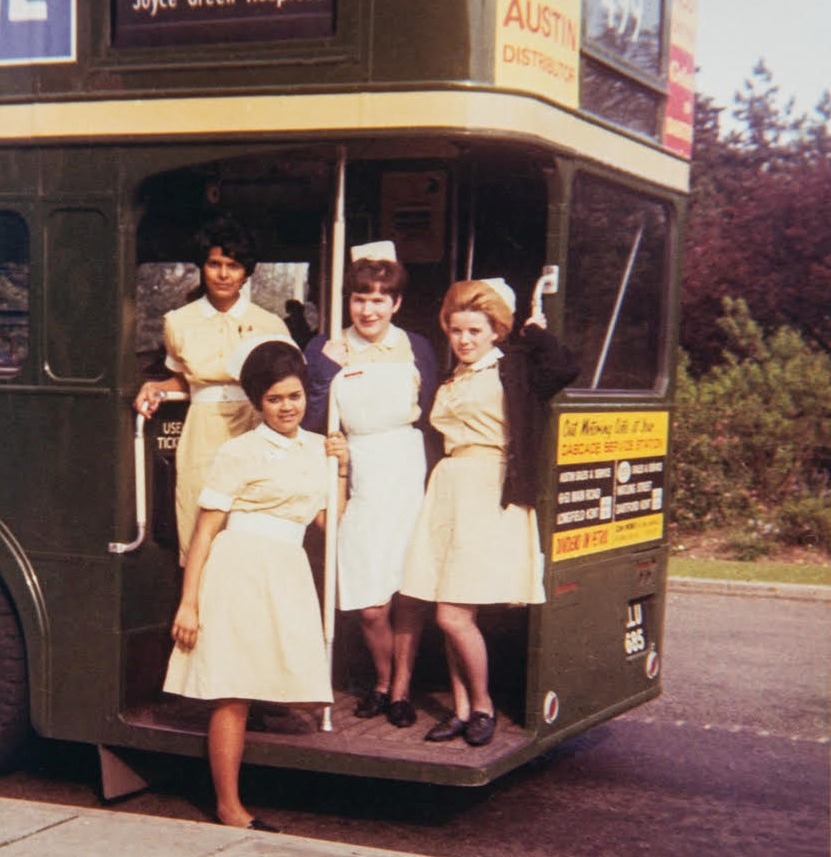
Following the establishment of the NHS in 1948 and given the urgent need to rapidly expand the number of nurses, there was an active campaign to recruit thousands of young Irish women as trainee nurses. Irish Nurses in the NHS is a three-year project that aims to relate the untold stories of these Irish nurses.
Advertisements were placed in national and provincial newspapers and recruitment officers travelled throughout Ireland interviewing potential student nurses. At a time when nurse training opportunities in Ireland were not only very limited but also extremely expensive, the chance to train for free, and to benefit from live-in accommodation, in British hospitals, proved highly attractive. By 1971 there were 31,000 Irish-born nurses in Britain, constituting 12% of all nursing staff.
The project involves interviewing Irish-born nurses who trained and worked in British hospitals from the establishment of the NHS in 1948 up to the early 1970s. Nine former nurses were interviewed in Liverpool, four of whom had arrived in the 1950s and five in the 1960s.
Recording from "Irish Nurses in the NHS - the Liverpool Story" - a public event held on 19 June 2023, including presentations by all project members and a conversation with Mary, one of the retired Irish nurses interviewed for the project.
For many migrants, Liverpool was an attractive destination because of its proximity to Ireland:
‘I think it was the nearest thing to Ireland and it was easy to get across on the boat’ (interview 23).
Although the boat was convenient it was very far from being luxurious or even comfortable:
‘oh it was awful, horrible! We couldn’t get a seat going over… there was only like benches’ (interview 24)
Several participants remembered the infamous cattle boats:
‘I came on the boat and the boats at that time came in to Birkenhead and they used to call them the “cattle boats.. loads of cattle on them, very little people on them but lots of cattle on them’.
Overall, our participants were very positive about Liverpool and many emphasised the particularly Irish quality of the city. Interview 27, originally from Dublin, noted the similarities between Ireland and Liverpool:
‘I find the Liverpool people actually very funny and a lot of their sayings are quite like a lot of Irish sayings’.
A few people did initially struggle with the accent:
‘It was strange at first and my accent people were, “What did you say Paddy?” everybody calls you Paddy! It was no good protesting, that was the way it was. And I had to repeat myself all the time… I couldn’t understand them and they couldn’t understand me’ (interview 25).
Participants vividly described the social scene in Liverpool during the 1950s-1960s. Many of our interviewees socialised in the Irish clubs of the time.
‘It was upstairs in the centre of Liverpool, there were six flights of stairs up. And then they used to call it The Shamrock, that was the name of it… and a lot of men and women, they met their wives and partners there, you know’ (interview 25)
Interview 29 recalls going to the Irish Centre in the 1960s:
‘I started to go the Irish Centre… the old Irish Centre and then that’s where I used to go on a Saturday night and all the big Irish bands were on a Sunday night. It was very good.’
Many participants had fond memories of the Irish Centre in the past, as a place where they socialised with friends, went dancing and even met their future partners. It was clear that, for many of them, the Irish Centre continued to play a key role now in retirement.
Nurse 25 who was a sprightly 89 years old and lived alone, explained the importance of the Irish centre:
‘I’m in the Irish club, mainly at weekends so I’m mixing still with Irish people’
Nurse 28, who is widowed and in her 80s still enjoys the dancing:
‘[I] go to the tea dances which are really good for when you’re retired’.
Project Next Steps:
"Irish Nurses in the NHS" is led by Professor Louise Ryan, London Metropolitan University, and Grainne McPolin, a freelance radio producer and former nurse, Neha Doshi, a PhD student at London Metropolitan University, is the research assistant. Together they have completed 45 interviews across Britain.
A book, consisting of a selection of more detailed stories around key themes is due to be published in 2024.
A podcast series of fifteen 20-30 minute episodes is being released from July 2023 onwards, please click below or go to https://shows.acast.com/irish-nurses-in-the-nhs to listen.
"Irish Nurses in the NHS" has received funding from the London Irish Centre, Irish Nurses and Midwives Organisation, Burdett Trust for Nursing and Emigrant Support Programme (Irish Abroad Unit). The Liverpool dimension of this project (2022-23) was funded by the Institute of Irish Studies University of Liverpool and supplemented by a wider grant from the Emigrant Support Programme.
Liverpool participants were recruited with the help of Breege McDaid, Director Irish Community Care, Margaret Lake, Outreach Support Worker Irish Community Care, and Gerry Diver, Strategy and Innovation Officer Institute of Irish Studies University of Liverpool. We wish to thank them for their assistance.